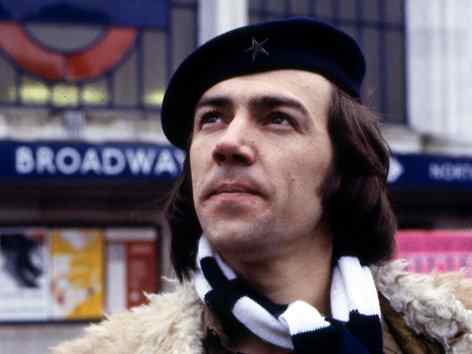Best British TV Shows & Series: 1970s & 1980s
The Best in 1970s British Sitcoms
Did the 1970s have the best British comedies ever? Hold on! That sounds like a question for the Q&A board rather than this article, but the question bears further examination. British TV in the 1970s has a glut of comedy, some good, some not so good but some out and out great. The sitcoms and sketch shows from the 1970s have shown that they have longevity.
GOLD (Go On Laugh Daily)
There is a British TV channel called GOLD (Go On Laugh Daily), and it shows British comedy shows all day, every day. Its most popular shows though are its 1970s shows: The Good Life, To The Manor Born, Citizen Smith, Whatever Happened To The Likely Lads, Some Mothers Do 'Ave Em, Steptoe and Son and Dad's Army, amongst others.
The 1970s is not a sharp change to the 1960s. In many respects, there is a lot of continuity with the same stars crossing over without any problems but the 1970s would prove itself to be a stellar decade in British comedy terms.
British Comedy Gold
The 1970s is rich in comedy gold. In addition to the sitcoms mentioned above, we had a few spillovers from the 60s like For The Love Of Ada, Til Dead Us Do Part, On The Buses and Nearest and Dearest, as well as some sketch shows like The Benny Hill Show and The Two Ronnies.
The Two Ronnies was a cleverly written 1970s sketch show, mostly written by Ronnie Barker and a then up and coming David Renwick (he later wrote One Foot In The Grave).
The Benny Hill Show
The Benny Hill Show was taking advantage of more lax censorship on TV, making best use of some buxom, bikini and hot pants clad girls being chased by what now seems to be a bunch of dirty old men but Benny Hill could be very funny with his other humour.
We had controversial British comedy TV shows like Love Thy Neighbour (openly racist, it was meant to be ironic but ironic doesn't work in a comedy in the 1970s) and Man About The House (one guy, two girls, lots of sexual innuendo and the possibility of a menage et trois?). There was even a 1970s series set in prison, Porridge.

Barbara and Tom Good leave their normal lives behind as they pursue the dream of self-sufficiency in "The Good Life"
BBC vs ITV
The early 1970s started pretty briskly in the comedy stakes with ITV making the better shows but BBC making one of the best, Steptoe and Son.
The mid-1970s was the period during which the BBC started to make real inroads in the comedy viewing figures. 1975 was the first year that Fawlty Towers was shown and that show is arguably, Britain's greatest comedy. The Good Life also made its debut in 1975 and was also on the BBC. Thereafter, the BBC went from strength to strength.
By the end of the decade, the BBC had taken over ITV's crown. ITV didn't really move with the times. Their last really successful year was 1978 when The Benny Hill Show, George and Mildred and Rising Damp were all still at the height of their success. Morecambe and Wise had switched over to ITV but were never as successful there.
In 1979, the BBC completely dominated British TV comedy with only Benny Hill still sustaining his viewing figures. The comedy dominance would continue into the 1980s and beyond.
The Best in 1980s British Sitcoms
1970s comedy shows have shown great longevity and the 1980s also had its fair share of good comedy. In many respects, the 1980s was a lot more radical and out there in comedy terms than the 1970s. Looking back on some of the sitcoms, it is amazing that TV stations got away with some of it, but we are so glad they did.
Recommended
- 1980: Compare Hi De-Hi, set in a Butlin's style holiday camp and Yes, Minister, set in the Houses of Parliament, both great BBC TV comedies, both very different.
- 1981: The Kenny Everett Television Show, Only Fools and Horses and Victoria Wood's first foray into screen comedy, Wood And Walters.
- 1982: Allo, Allo at one end of the spectrum and The Young Ones at the other.
After The Young Ones and its anarchic comedy, British comedy would never be the same again—a new door had been opened for those who dared to go through it. There would still be the old favourites (Only Fools & Horses, Eric Sykes, Dick Emery) but they would have to share airtime with Kevin Turvy Behind The Green Door and Comic Strip Presents.
Comedy Hits Mid-Decade Lull
That momentum though didn't really keep rolling until later in the decade. Who knows why? Perhaps the same people were in charge and there just wasn't a brave enough spirit to change things completely. Blackadder makes its first appearance in 1983 and New Statesman in 1984 but it still appears with the likes of Ever Decreasing Circles.
The mid 1980s continues in this vein although there were a few stand out British TV shows amongst the pack. Some have not stood the test of time, but that's probably because they were of their time. For example, Watching, Rab C Nesbit and Red Dwarf, One Foot In The Grave and Birds of A Feather all look like 1980s comedies.
Red Dwarf still has a huge sci-fi cult following and Birds of A Feather is set to return soon. Because there was nothing as anarchic as The Young Ones in the 1980s, it still stands out as one of the best sitcoms, a truly unique comedy and one whose script people of a certain age seem to like to memorise and repeat when an opportunity arises.
British Drama and Documentary
Callan starring Edward Woodward had been on British TV since 1967 and continued its success early into the 1970s. It was an espionage drama with a bit of edge and written by James Mitchell who went on to write one of the 70s and 80s most popular dramas, When The Boat Comes In, a tale of a northeastern English family making good after the second world war.
One of its stars, James Bolam had already been popular in Whatever Happened to The Likely Lads and would also score a success with The Beiderbecke Tapes with Barbara Flynn. In another degree of separation, Barbara Flynn had starred in A Family At War a tale of a Liverpool family's experiences of love and loss during the second world war—and not a Scouse accent amongst them!
The early 1970s seems to have been quite a time for nostalgic and wartime historical drama, Colditz was a huge hit as was Dad's Army, a comedy about the British Home Guard. What Britons weren't yet ready for in the sixties, they were more than ready for in the 1970s. Perhaps time is a great healer.
The Persuaders
The Persuaders saw Roger Moore return after his successful stint as The Saint. His co-star was Tony Curtis, so some Hollywood glamour made this a huge success. Two hugely successful cop shows took to the air in 1972 and 1973 with Special Branch and Van der Valk (the latter spawning a number one record with its theme tune). But neither of them had the grit of The Sweeney starring John Thaw and Dennis Waterman.
1974 brought Within These Walls, a tale of the life inside if a fictional women's prison. It was the top Saturday night drama, appearing after The Generation Game so that was your Saturday night sorted out—entertainment all the way. Within These Walls was copied later on by the Australian drama, Prisoner of Cell Block H. Upstairs Downstairs appeared for the first time in 1975 and is still, in my humble opinion, much, much better than the remake.
One-Off British TV Dramas
Some one-off dramas started to be made, among them Lillie, the story of the King's mistress, Lillie Langtry starring Francesca Annis. It held viewers captive for 13 episodes. This one-off format would be copies for most of the drama series of the '70s and '80s and is still used today.
Secret Army, Angels and Shoestring all had a couple of years of success before being cancelled, Angels, in particular, was initially very successful and was a welcome return to hospital based drama before its absolute pinnacle in the 1980s, Casualty (still on as Holby City now).
The 1970s really carried on where the excellent 1960s dramas had left off with some outstanding drama series like Poldark, Onedin Line and The Pallisters. One-off drama, whilst never reaching the fame of Cathy Come Home, nonetheless made their mark. Shows like Scum and Dennis Potter's Blue Remembered Hills, Brimstone and Treacle, Singing Detective and Pennies From Heaven. TV started to make theatrical drama and it all worked to perfection.
Daniel Day-Lewis
Anthony Minghella's Truly, Madly, Deeply was first shown on BBC2 before it was released as a movie and My Beautiful Launderette was a Channel 4 production which also crossed over to cinema with some success, whilst also making a star of Daniel Day-Lewis.
The fantastic Edge of Darkness starring an intense Bob Peck kept British TV audiences gripped with its tales of nuclear theft. The co-star, Joe Don Baker was also amazing in the show, both actors gaining accolades for the series.
Also in the 1980s, with now not three, but four terrestrial channels, we got more soap operas: Brookside from Channel 4, which ended in the 1990s, and the more dramatic and still popular Eastenders.
In Praise of David Attenborough
David Attenborough started his amazing TV career in the 1960s as controller of BBC2 but he has since admitted that he never really enjoyed office jobs and went back to doing what he enjoyed best—making fantastic wildlife programmes.
Attenborough certainly had an eye for a success. Amongst the shows he commissioned were Call My Bluff, for years a highly successful and very amusing quiz show. The Old Grey Whistle Test and Monty Python's Flying Circus are another two of his commissions. It is a shame he could not mix both jobs; we may have gotten more great shows.


